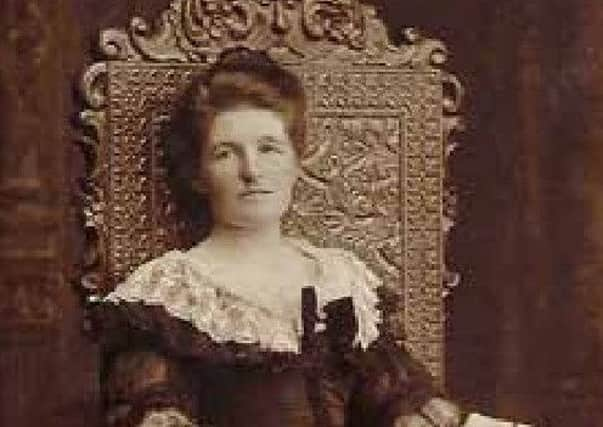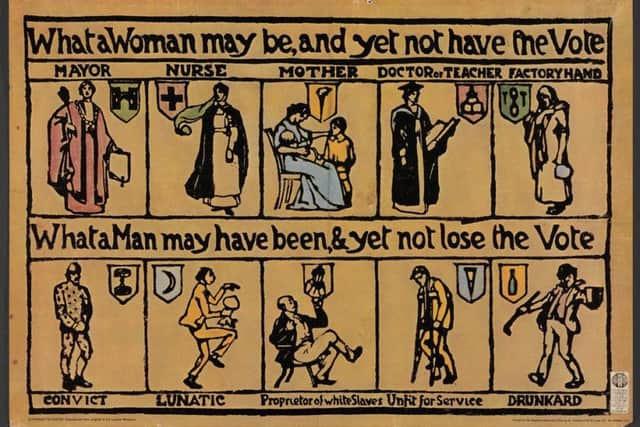Elizabeth Gould Bell: Feminist trailblazer whose life was sadly blighted by family tragedies


Elizabeth Gould Bell was a supporter of the women’s suffrage movement.
She was a close friend and ally of Mrs Pankhurst, the founder of the Women’ Social and Political Union in 1903.
Advertisement
Hide AdAdvertisement
Hide AdShe was also friendly with Lady Betty Balfour, wife of Gerald Balfour, a former Conservative chief secretary for Ireland, and daughter of Edward Robert Bulwer-Lytton, the 1st Earl of Lytton. Lady Betty was an active suffragist and sought to convince the leadership of the Conservative Party of the justice of votes for women. Actually the leadership of the Conservative Party was much more receptive to the proposition than the leadership of the Liberal Party.


The first female medical graduate in Ulster, Elizabeth qualified in 1893 from the Royal University of Ireland (RUI). She was born on December 24 1862 in Newry, Co Down, and was the daughter of Joseph Bell of Spring Hill, Newry, clerk of the Newry Poor Law Union. She had a brother, W P Bell who also became clerk of Newry Poor Law Union, and a sister, Margaret, who also qualified in medicine and set up in practice in Manchester. Margaret married John Boyd, a doctor who was originally from Ballymoney.
Elizabeth married Dr Hugh Fisher on March 2 1896 in Fitzroy Presbyterian Church in Belfast but her husband died in 1901 of typhoid fever, leaving her a widow after only a few years of marriage – the first great tragedy of Dr Bell’s life.
Hugo Bell Fisher, their only son, a medical student at Queen’s University, Belfast, became a lieutenant in the Royal Munster Fusiliers and died, aged 19, of wounds sustained during the Third Battle of Ypres in a German military hospital on November 23 1917 – the second great tragedy of Bell’s life.
Advertisement
Hide AdAdvertisement
Hide AdA pre-war suffrage poster highlighted the fact a woman could be a mayor, a nurse, a mother, a doctor or a teacher and not have the vote. It also claimed that a man could have been a convict, a lunatic or a drunkard and yet still possess the franchise.
A number of female doctors – Elizabeth Garrett Anderson is the outstanding example – were outraged that women were excluded from the parliamentary franchise. Anderson had been the first woman in Britain to qualify as a doctor and a surgeon. Her sister was Millicent Fawcett of the National Union of Women’s Suffrage Societies (NUWSS). Anderson was at least theoretically more militant than her sister.
Like Dr Bell, Anderson was a member of the WSPU and became particularly active after the death of her husband in 1907. In 1908 Anderson became mayor of Aldeburgh, the first woman to become mayor of any town in the British Isles (a fact which assists in dating the poster referred to above). Anderson tirelessly used her position as mayor as a platform to promote female suffrage.
In November 1911 Dr Bell was arrested for throwing stones at various London department stores and was imprisoned in Holloway. The first recorded militant act by the movement in Belfast took place on November 16 1912 and was an attack on the General Post Office in Donegall Square in which its windows were smashed.
Advertisement
Hide AdAdvertisement
Hide AdIt is impossible to say with any certainty whether Dr Bell was involved or not but when Lilian Metge, a wealthy widow and friend, founder of the Lisburn Suffrage Society and the lady who is believed to have been responsible for blowing up the chancel of Lisburn Cathedral in August 1914, asked whether she knew anything about the incident, she simply smiled sweetly.
The context for some of this militancy was Sir Edward Carson’s unexpected announcement that women’s suffrage would be granted under plans for a provisional government of Ulster. However, when the constitution of the provisional government was publicised in September 1913, there was no mention of votes for women. Dr Bell and others contended that Carson had ‘reneged’ on his ‘pledge’ and this provided their justification for intensification of their campaign and, more specifically, their resort to arson against unionist-owned property. Dr Bell subsequently insisted that she checked there were no people in these buildings before they were torched.
Dr Bell also took care of suffragettes who had been subjected to forced feeding by the prison authorities after embarking on hunger strike.
By far the greater part of her career was spent in Belfast where her patients were mostly women and young children but in the first decade of the 20th century she was in Manchester (probably with her sister) and during the Great War she worked in Malta, where soldiers and sailors wounded in the eastern Mediterranean were treated.
Advertisement
Hide AdAdvertisement
Hide AdDr Bell was honorary physician to the Maternity and Baby Home at The Grove and medical officer to the Belfast Corporation’s ‘Baby Club’, a welfare scheme run by the corporation providing subsidised milk for impoverished mothers.
In February 1919 Dr Bell was appointed as medical officer to Riddel Hall which was founded and endowed by the Misses Eliza and Isabella Riddel. They had donated a substantial sum of money (£35,000) to build Riddel Hall as an independent hall of residence for female Protestant students and teachers of Queen’s University in 1913. Dr Bell subsequently became a governor of the permanent committee of Riddel Hall.
She taught students in the Presbyterian Deaconesses’ Home. She was also interested in temperance and supported the Ulster Women’s Christian Temperance Association.
Noted for her ‘striking personality and intellect’, she lived at 83 Great Victoria Street, Belfast, before moving to 4 College Gardens.
Advertisement
Hide AdAdvertisement
Hide AdShe died after a long and painful illness on July 9 1934. One obituary described her as a ‘pioneer of the feminist movement in Ireland’.
On October 11 2016 the Ulster History Circle erected a Blue Plaque to honour Dr Bell at Daisy Hill Hospital in Newry. The location was chosen because it was the site of the Newry Workhouse where Dr Bell grew up and where her father worked.